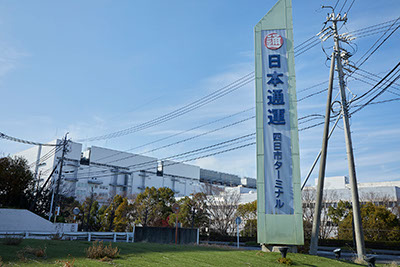NIPPON EXPRESS: INTEGRATING THE CIRCUITOUS, SOLVING SEMICONDUCTOR LOGISTICS Vol.3
February 18,2021
- ― Forward after storage: Nippon Express’ capabilities
-
Consider the warehouse Nippon Express has built outside of one of Japan’s largest semiconductor plants in Yokkaichi, Mie Prefecture (see photos and description). The warehouse boasts 24-hour service, minute-by-minute just-in-time delivery capacity as well as renting out space to equipment manufacturers so engineers can rush to the factory with maintenance parts. Efficiencies and know-how, including thorough inspection processes for items as small as several millimetres, which are acquired here will be replicated in other warehouse facilities planned elsewhere by the company. Such warehousing is increasingly vital for chipmakers seeking to reduce in-factory stock to improve efficiencies, explains Mr. Goya.
 Ryuji Goya,
Ryuji Goya,
Executive Officer
Business Development Division, Customer Service center,
Marketing Strategy Division, Sales Strategy Division
NIPPON EXPRESS CO., LTD.
Another advantage for Nippon Express is its deep ties to Japanese semiconductor tool makers and raw material suppliers. Although Japanese chip makers have fallen behind in global rankings to South Korean and Taiwanese rivals, Japanese firms remain top players in machines and raw materials such as silicon wafers, photo resists, and various chemicals used in chipmaking.
-
The Japanese forwarder has been providing logistics solutions for Japanese companies which supply nearly a third of the global market of semiconductor manufacturing equipment. Through these relationships, Nippon Express has developed its own specialized tools and methods to transport and set up such machinery in the highly challenging environment of clean rooms in chip foundries.
 Such attention to detail in inspection, storage, and transport makes the Yokkaichi warehouse not only a site of storage, but also an active partner in improving the chip production process.
Such attention to detail in inspection, storage, and transport makes the Yokkaichi warehouse not only a site of storage, but also an active partner in improving the chip production process.
“We are continually evolving our expertise, for example by building a clean room train staff in setting up the equipment,” says Mr. Goya. “With our unique capabilities we hope to become the world’s top runner in providing logistics to, and act as an irreplaceable partner for, semiconductor equipment makers.”
Looking forward, Japanese semiconductor toolmakers also find themselves with potentially new demand from two recent developments. First, restrictions on exports of US-manufactured chips to China may mean global manufacturers will need to purchase Japanese equipment if they wish to continue supplying the world’s largest market. The other is the surge for demand in equipment and materials used for EUV (“extreme ultraviolet lithography”) lithography, the new-generation manufacturing process needed for the most advanced chips such as those used in 5G smartphones. Currently, Japanese companies dominate the supply of inspection equipment and light sources as well as coater/developer tools used in the EUV process.